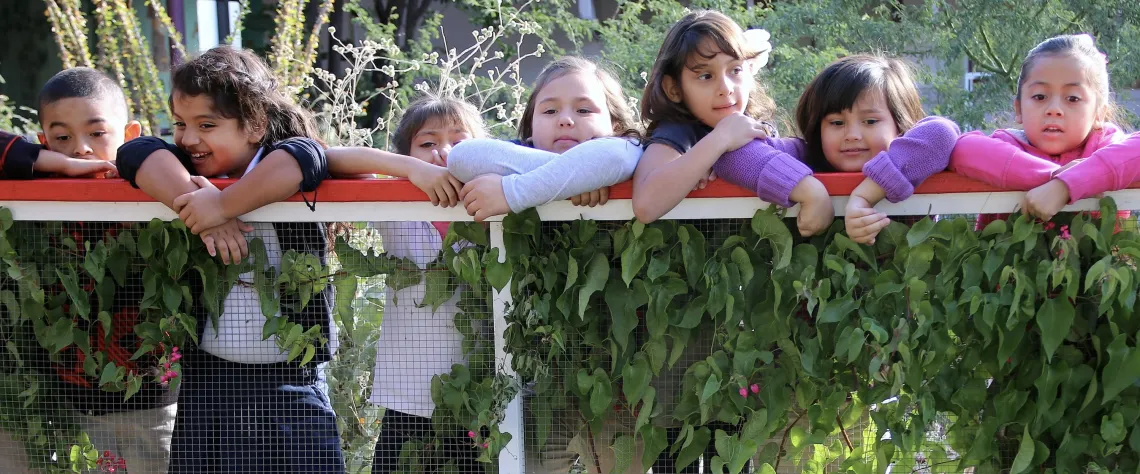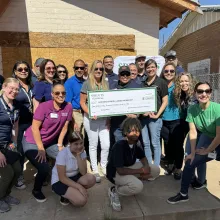Growing Minds and Community: U of A School Garden Workshop Expands with Sprouts House

Last year, Keyan Dickson’s sixth-grade science class at Mansfeld Middle Magnet School got to work in the school garden. The students harvested native and non-native plants, measured ingredients, and created recipes for dyes — learning where the plants originated, their use in different cultures, and how they support the economy.
Projects like this, which combine gardening and food education, are part of the University of Arizona School Garden Workshop, or SGW — a program that connects Tucson K-12 students and their communities to food, through hands-on nutrition and culinary experiences, centered around a school garden model.
The School Garden Workshop, housed in the School of Geography, Development and Environment in the College of Social and Behavioral Sciences, is a multi-year partnership with Tucson Unified School District. In addition to placing U of A interns at 18 under-resourced schools, the program supports over 60 school gardens, providing teachers with professional development, curricular resources, consultations, and community workdays.
Soon, the SGW will expand its community reach and nationwide educational capacity through the creation of Sprouts House, made possible by a $1 million lead gift from Sprouts Healthy Communities Foundation — the corporate foundation of Sprouts Farmers Market Inc.
The Sprouts House project includes the renovation of two U of A-owned historical houses next to Mansfeld Magnet Middle School. One bungalow will be renovated into a community classroom and the other into a commercial kitchen. The yard will become a teaching and production garden with a greenhouse. The Sprouts House’s proximity to the university makes it an ideal location for training interns enrolled in the SGW course. Sprouts House also will provide program continuation for several westside elementary school gardens and the garden at Tucson High Magnet School. The project’s total cost is $2 million, and the goal is for Sprouts House to be operational by late spring 2025.
“Sprouts House will be the linchpin in the School Garden Workshop’s K-12 school garden pipeline and the coalescence of 15 years of school garden experience, deep community need, and the perfect time and place,” said Moses Thompson, director of the School Garden Workshop.

The Sprouts Healthy Communities Foundation presented the university’s
School Garden Workshop with more than $1 million on May 15. Credit: Chris
Richards/University Communications
The vision is for Sprouts House to be a national model school garden and culinary education center, Thompson said. Each year, Sprouts House is projected to impact 150 educators, 150 university students, and more than 6,000 K-12 students.
The Sprouts Healthy Communities Foundation helps kids thrive by making nutrition education and gardening accessible. Through partnerships with nonprofits, kids learn to grow and prepare healthy foods, which encourages healthy habits.
“Sprouts is all about building healthy communities. When we saw the opportunity to connect to Mansfeld Middle School with these two bungalow houses right across the street, we wanted the space to be something that would inspire kids and be a point of pride for the community,” said Lyndsey Waugh, executive director of the Sprouts Healthy Communities Foundation.
Sprouts supports school garden programs in over 10,000 schools across 23 states and quickly recognized the workshop’s reputation, eager to become a supporter. When the idea of establishing a best-in-class educational center came up, Sprouts was on board from day one.
“No other organization does it better than School Garden Workshop when it comes to connecting the university, schools, and the community, in the school garden space,” Waugh said. “All of us at Sprouts are proud to be part of this project and to share in the incredible impact it will have on children and our community for years to come.”
THE PEOPLE BEHIND THE PROGRAM: FOSTERING EXPERIENTIAL LEARNING
Maria Celis is the SGW K-12 curriculum specialist whose hands-on, interdisciplinary approach takes students outdoors to learn about topics like ecology, which is how Keyan’s class explored botany through plant dying.
“The coolest part was how Ms. Maria came out to help us and teach us new stuff . . . like learning how to weave artworks and dye thread,” Keyan said.
Lindsay Aguilar, director of the TUSD Food Services Department, has collaborated with Thompson for 10 years.
“To me, as a registered dietitian, empowering students with the knowledge of nutrition and food and having that be part of their educational experience is a life skill,” Aguilar said. “Having students see the benefits of their hard work, growing food in the school garden — we know from research that if they grow it, they’re much more inclined to consume and enjoy it.”
“The School Garden Workshop’s positive impact on U of A students, K-12 students, and our community will now expand due to the generosity and vision of Sprouts Healthy Communities Foundation.”
— Lori Poloni-Staudinger, SBS Dean
INTERNSHIPS INTEGRAL TO SUCCESS
Since its inception in 2011, the SGW has trained 40 to 60 U of A interns a semester to serve in TUSD schools. Interns log up to 12 hours per week, supporting teachers who use the gardens to teach ‘real world’ applications that complement classroom lessons. To date, over 800 U of A students representing 64 majors have participated.

Yarn soaking in jars of plant dye at Mansfeld Middle Magnet School.
Credit: Maria Celis
“The students respond to the immediate needs of the schools,” said Thompson. “That’s garden maintenance, planting and harvesting. They are trained to do curriculum development and use the garden as teaching spaces and to use the gardens therapeutically. They do food literacy and culinary activities. And they help coordinate and run community farmers markets with the produce grown.”
Marissa Diaz took the SGW in fall 2023 as part of her B.A. program. She sees Sprouts House as an opportunity to offer K-12 students nontraditional learning experiences.
“It’s a space where they can explore, experiment, and connect with their environment in ways that they might not have access to otherwise,” Diaz said.
LOOKING AHEAD
With the initial donation of $1,050,000 from Sprouts Healthy Communities Foundation, the project seeks additional support, including $350,000 for naming rights to the commercial kitchen. This essential space allows donors to contribute to the project’s success and emerging reputation as a nationwide model.
“Our program has gained a lot of national attention and there has been demand for us to go out and do work with other school garden nonprofits around the country,” Thompson said. “Sprouts House will serve as a national training site during the school year.”
Marissa Diaz sees Sprouts House as more than just a school garden model.
“For the larger community, Sprouts House helps to build a sense of unity and shared purpose,” Diaz said. “It’s about more than just growing plants — it’s about growing minds and strengthening community connections.”
##
This story was included in the fall 2024 Developments newsletter.

